Table of Contents
Part 7: The Gospel Spreads from Asia to Europe. Copyright © 2005 All rights reserved Call of Hope. First edition. 1992. SPB 9047 ENG. English title: The Arrival of the Gospel from Asia to Europa (Booklet 7). German title: Die Ankunft des Evangeliums in Europa (Heft 7). Call of Hope.
P.O.Box 10 08 27
70007
Stuttgart
Germany
<e-mail: info@call-of-hope.com>
http://www.call-of-hope.com
.
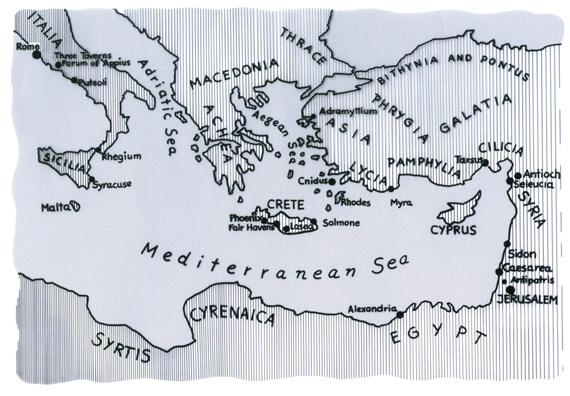
Jesus had given His followers the task of preaching the message of salvation to all nations around the world.
Peter, John, Mark, Philip, and the rest of Jesus' disciples obeyed His command, preaching the good news of salvation wherever they went. Everyone should experience the fact that Jesus is the only Saviour from sin. The disciples' mission was wonderful but hard - and also dangerous at times. People did not always believe what they said; sometimes they were insulted, beaten, and imprisoned. People did not always believe what these men said. But despite the persecution and difficulties, the disciples told others about what they had seen and heard from Jesus. They wanted everybody to experience salvation and peace in the name of Jesus Christ, as they had experienced it themselves.
The Apostle Paul made long journeys to distant lands to preach the Gospel to people who had not yet heard about God the Father and the Lord Jesus Christ.
Paul and his helper Barnabas went by ship to the island of Cyprus, in the eastern part of the Mediterranean Sea, to tell the people there that Jesus wanted to save them. The inhabitants there listened to them carefully, and some believed the Gospel. Thus, a Christian church was established in Cyprus. (locate Cyprus on the map above).
From Cyprus, Paul and Barnabas sailed to Asia Minor (known today as Turkey), and proclaimed the Gospel there. As a result of these efforts, Christian churches were set up in Perga, Antioch, Iconium, Lystra, and Derbe.
Afterwards, Paul and Barnabas returned to Jerusalem where they met with church leaders. With great enthusiasm, the two disciples reported what they had done in the nations of Asia Minor. They all praised God together, because many people had found truth, receiving Jesus Christ as Lord in their lives.
After some time, Paul said, Let's go and visit the places where we have already evangelised, to encourage our brothers and sisters there. Barnabas did not go with Paul this time, so Paul chose Silas as a travel partner. All the church members wished them a blessed journey under the guiding hand of the Lord.
Paul journeyed through Lebanon and Syria on his way to Asia Minor where he visited the believers and strengthened their faith in Christ. In time, the number of people who followed Jesus increased.
Paul reached the mountains in Turkey on his way to Derbe and then travelled to Lystra where Timothy lived. Timothy was a young man who believed in the Gospel from the first evangelistic journey that Paul had made. Timothy had a good reputation among his fellow believers. He was known as being a true servant of the Lord.
Paul chose Timothy to join him for the rest of the trip. Later on, he wrote to the Philippians about Timothy, saying: There is no one else here other than Timothy who sees things as I do and takes a genuine interest in your concerns. You know that he has been at my side in the service of the Gospel like a son working under his father.
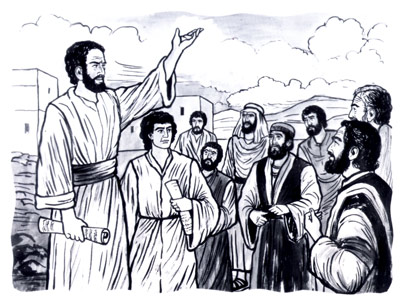
Paul visited the believers in Asia Minor and strengthened their faith. But where was he to go with his companions to preach the Gospel of Jesus Christ? Paul was careful not to go where he himself wished, but to where the Lord was guiding him.
They passed through northern Turkey (Phrygia and Galatia) on their way to Ephesus, but the Spirit of God did not allow them to go into this area. So they continued their journey to the borders of Mysia. Here, the Holy Spirit also prevented them from going to Bithynia. So they asked: O Lord where do You want us to go? What is Your will?
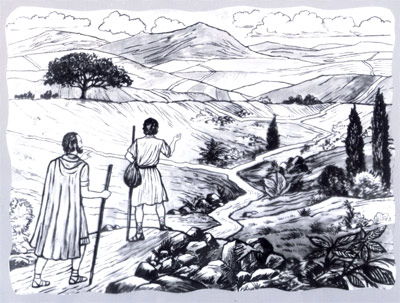
There was only one way open for them to go; they travelled to the city of Troas by the sea.
Sometimes, the Lord leads his chosen people to a situation where all the doors are closed except one, and this is a specific guidance from God. This circumstance gave Paul some confirmation about God's will.
During the night, a vision came to Paul. He saw a man standing on the seashore, saying: Come across to Macedonia and help us. Paul then realised God's will and plan. God wanted them to go to another continent, Europe, to present the Gospel to the nations there.
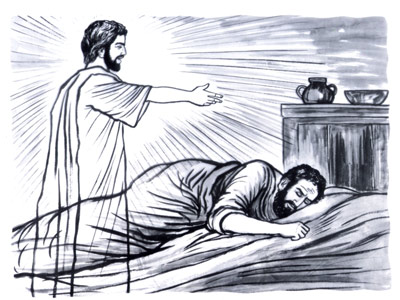
God called Paul to Europe, and he obeyed without hesitation. He did not know what was in store for him and his companions in these distant countries, but one thing he did know: He had to preach the Gospel there.
In Troas, Paul had a new assistant: a Greek doctor named Luke who later wrote an account of the Gospel of Christ and also a book about the acts of the apostles. Thanks to Luke, we can now read all about what the Lord did through His apostles.
The Apostle Paul and his companions went to a sea port in order to board a ship bound for Europe. (See the map at the beginning of this story to get an idea of the route they followed.)
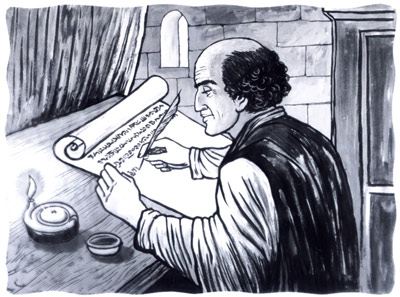
From Troas, the ship sailed directly to the island of Samothrace. The men were grateful that a strong and steady breeze carried them quickly to their destination. They sensed the mighty hand of God guiding them.
At night the ship dropped anchor near Samothrace. The next day they sailed on to Neapolis where, for the first time, they set foot on European soil. From there they went to the capital of Macedonia.
This province was one of the Roman colonies, the capital of which was Philippi. Paul and his companions were total strangers here, and they felt out of place. They spent several days exploring this fascinating city, looking for opportunities to talk to the people and preach the Gospel.
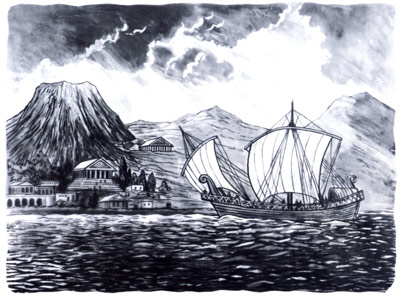
Paul, Silas, Timothy, and Luke waited until Saturday to go to the synagogue and proclaim the good news of salvation. Finding no synagogues in this city, they went to a river, two miles from the city. There they noticed some women kneeling in prayer. With wisdom they told the women about Jesus, the Saviour of mankind. The women listened carefully - especially Lydia, a dealer in expensive, purple cloth.
She was very rich, but her wealth did not bring her happiness or Peace in her heart. She was searching for true joy and meaning for her life. She longed for something to fill the emptiness she felt inside herself.
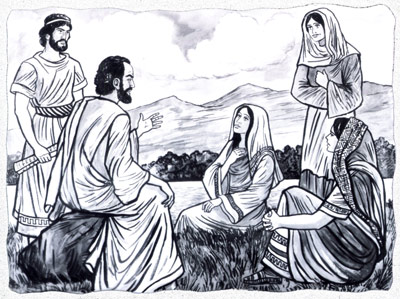
But then a great miracle happened: The Lord opened her heart, so that she could believe what He was telling her through Paul. She became the first Christian woman in Europe. Thousands of men and women have followed her example, submitting their lives to the Lord of heaven and earth. Lydia realised the true meaning of life, and a deep contentment and peace filled the emptiness of her heart.
Lydia not only presented her life to her Saviour, but her house and possessions as well. Then she and her household were baptised in the name of Jesus Christ. She invited Paul and his companions to stay at her home. Christianity began to spread all over Europe because of this God-fearing woman, and the first Christian centre started in her house!
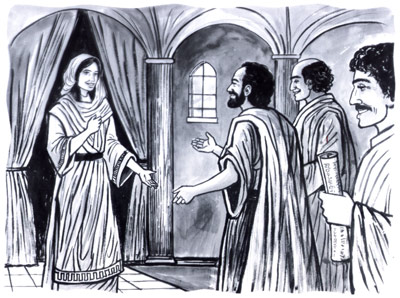
One day, while Paul and his companions were on their way to a place of prayer, they met a slave girl who was a fortune teller; she was possessed by an evil spirit. She followed these men and cried out loudly: These men are the servants of the true God. They are declaring to you the way of salvation.
This message described the truth about Paul and his ministry, but the Apostle knew what was behind it. So he rejected it, because he did not want any publicity from the devil.
Fortune-telling always works against the teachings and the witnesses of Jesus. Therefore, Paul turned to the girl and addressed the evil spirit through the power of the Lord: I command you in the name of Jesus Christ to come out of her, and it went out.
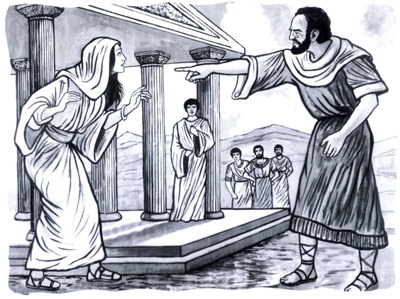
This event brought about unfavourable results for Paul and his companions. When the girl's owners saw that she had lost her power of fortune-telling, they realised that they would no longer be able to make money from her services. And they were angry. Losing their tempers, they seized Paul and Silas and dragged them to the city authorities, accusing them before the judge: These men are causing a disturbance in our city with their strange customs which are illegal for us Romans to accept and follow.
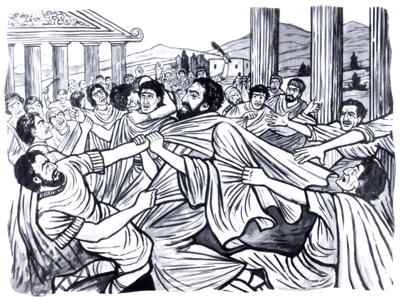
The girl's owners succeeded in turning the city officials and the townsfolk against Paul and Silas. In front of all people, the men of God were stripped and beaten with rods until they bled. Then they were thrown into prison.
The jailor had strict orders to keep Paul and Silas under close guard. He locked their feet in stocks and kept them in a dark cell deep inside the prison. There they spent hour after hour, sitting motionless with their bodies badly bruised and aching.
What would you do if you were in their position, having been beaten and unjustly imprisoned? Would you behave as Paul and Silas did? Instead of groaning in misery or cursing their tormentors, they started to pray and sing songs of praise to God.
The rest of the prisoners could not understand the meaning of these prayers in the dark. Does it make sense for prisoners to sing in their cell after being beaten?
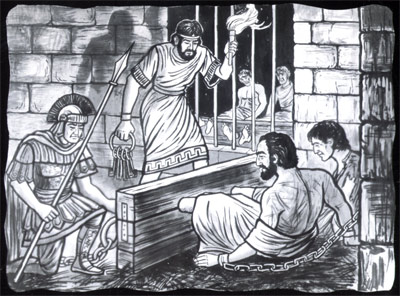
All of a sudden, the earth shook, and the prison foundation was violently shaken. Thus, help was coming from the Lord, but it was disguised as an earthquake. Suddenly, all the doors burst open, and the chains were loosed. The whole prison was in ruins. The jailor woke up panic-stricken, when he saw the doors of the prison wide open. He thought that the prisoners had all escaped. Thinking of the punishment and disgrace he would have to endure for having lost all the prisoners, he drew out his sword, intending to kill himself. But Paul shouted: Do yourself no harm. We are all here.
The jailor took a lamp and rushed into the cell. Trembling with fear, he fell down before Paul and Silas. After he brought out the two men of God, he asked, Sirs, what do I have to do to be saved? They answered him, Believe in the Lord Jesus, and you and your household shall be saved.
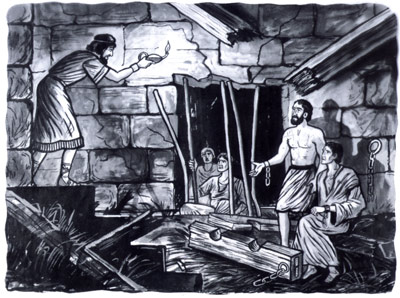
After Paul and Silas told God's message to the jailor and his family, all of them believed in the Gospel. They were all baptised immediately, and they rejoiced. The next morning Paul and Silas were set free, and the city officials apologised to them.
The disciples then encouraged the faith of the brothers and sisters in Philippi before continuing their journey through Europe. They spread the message of salvation to Thesselonica; Berea, Athens, and Corinth. Then they returned to Jerusalem via Ephesus.
Have you heard the call of Jesus? Have you told your friends and neighbours the good news that the salvation of God is really prepared for them?
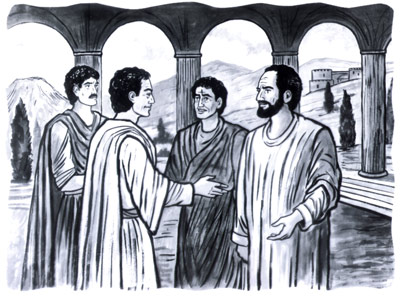
We hope you have enjoyed reading this story. Below are some questions about it. When you have answered them, mail them to us.
Why did the disciples spread the good news?
Where did Paul and Barnabas preach the Gospel on their first trip?
Who accompanied Paul on his second trip?
Why did Paul make Timothy his companion in the ministry?
Where did the Spirit of God prevent Paul from going?
What did Paul see and hear in his dream?
In what city did Paul find his fourth co-worker?
Who is the author of the book of Acts?
Who was the first Christian woman in Europe?
Where was the first spiritual and evangelistic centre in Europe?
Describe how God arranged circumstances, so that the disciples could lead the jailor's family to believe in Christ?
What were the main characteristics of God's witnesses in your opinion?
Do not forget to print your full name and address clearly on your answer sheet as well as on the envelope. Our address is:
Call of Hope,
P.O.Box 100827,
D-70007,
Stuttgart,
Germany

